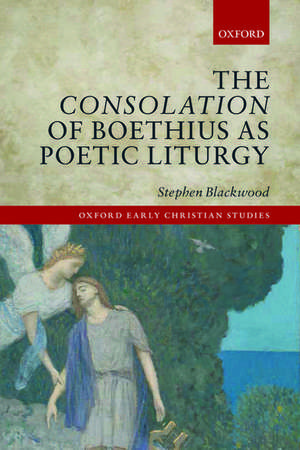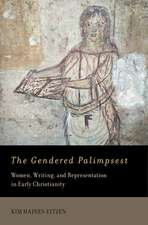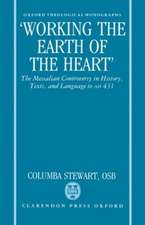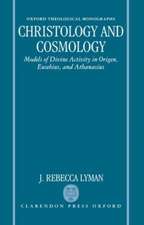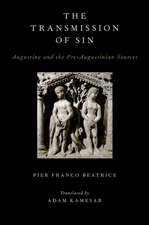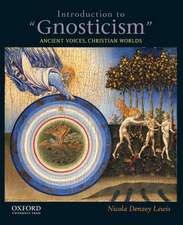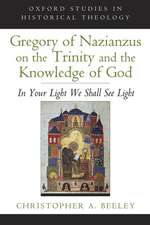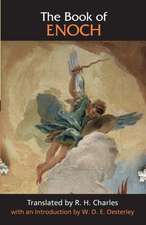The Consolation of Boethius as Poetic Liturgy: Oxford Early Christian Studies
Autor Stephen Blackwooden Limba Engleză Hardback – 16 apr 2015
Din seria Oxford Early Christian Studies
- 30%
 Preț: 500.48 lei
Preț: 500.48 lei - 12%
 Preț: 252.05 lei
Preț: 252.05 lei - 17%
 Preț: 582.40 lei
Preț: 582.40 lei - 19%
 Preț: 497.45 lei
Preț: 497.45 lei - 30%
 Preț: 582.12 lei
Preț: 582.12 lei - 28%
 Preț: 472.87 lei
Preț: 472.87 lei - 30%
 Preț: 528.78 lei
Preț: 528.78 lei - 30%
 Preț: 491.67 lei
Preț: 491.67 lei - 25%
 Preț: 627.62 lei
Preț: 627.62 lei - 17%
 Preț: 581.27 lei
Preț: 581.27 lei - 28%
 Preț: 437.84 lei
Preț: 437.84 lei - 27%
 Preț: 573.73 lei
Preț: 573.73 lei - 12%
 Preț: 616.72 lei
Preț: 616.72 lei - 20%
 Preț: 705.73 lei
Preț: 705.73 lei - 25%
 Preț: 568.80 lei
Preț: 568.80 lei - 30%
 Preț: 504.56 lei
Preț: 504.56 lei - 30%
 Preț: 542.84 lei
Preț: 542.84 lei - 26%
 Preț: 517.83 lei
Preț: 517.83 lei - 26%
 Preț: 598.30 lei
Preț: 598.30 lei - 30%
 Preț: 820.42 lei
Preț: 820.42 lei - 34%
 Preț: 1036.50 lei
Preț: 1036.50 lei - 30%
 Preț: 1107.11 lei
Preț: 1107.11 lei - 22%
 Preț: 361.61 lei
Preț: 361.61 lei - 34%
 Preț: 1326.79 lei
Preț: 1326.79 lei - 9%
 Preț: 255.03 lei
Preț: 255.03 lei - 34%
 Preț: 1123.50 lei
Preț: 1123.50 lei - 34%
 Preț: 845.94 lei
Preț: 845.94 lei - 14%
 Preț: 449.09 lei
Preț: 449.09 lei - 34%
 Preț: 1195.96 lei
Preț: 1195.96 lei - 22%
 Preț: 391.92 lei
Preț: 391.92 lei - 34%
 Preț: 1033.77 lei
Preț: 1033.77 lei - 34%
 Preț: 1255.59 lei
Preț: 1255.59 lei - 34%
 Preț: 819.81 lei
Preț: 819.81 lei - 19%
 Preț: 293.17 lei
Preț: 293.17 lei - 34%
 Preț: 1725.86 lei
Preț: 1725.86 lei - 34%
 Preț: 1761.02 lei
Preț: 1761.02 lei - 30%
 Preț: 947.60 lei
Preț: 947.60 lei - 34%
 Preț: 888.89 lei
Preț: 888.89 lei - 30%
 Preț: 1006.79 lei
Preț: 1006.79 lei - 30%
 Preț: 835.47 lei
Preț: 835.47 lei - 30%
 Preț: 1415.68 lei
Preț: 1415.68 lei - 34%
 Preț: 1199.53 lei
Preț: 1199.53 lei - 34%
 Preț: 756.65 lei
Preț: 756.65 lei - 34%
 Preț: 1107.76 lei
Preț: 1107.76 lei - 34%
 Preț: 873.24 lei
Preț: 873.24 lei - 34%
 Preț: 1446.26 lei
Preț: 1446.26 lei - 28%
 Preț: 338.52 lei
Preț: 338.52 lei - 34%
 Preț: 2061.53 lei
Preț: 2061.53 lei - 34%
 Preț: 1036.54 lei
Preț: 1036.54 lei
Preț: 878.94 lei
Preț vechi: 1178.19 lei
-25% Nou
Puncte Express: 1318
Preț estimativ în valută:
168.21€ • 173.77$ • 139.99£
168.21€ • 173.77$ • 139.99£
Carte tipărită la comandă
Livrare economică 15-21 martie
Preluare comenzi: 021 569.72.76
Specificații
ISBN-13: 9780198718314
ISBN-10: 0198718314
Pagini: 362
Dimensiuni: 156 x 238 x 29 mm
Greutate: 0.68 kg
Editura: OUP OXFORD
Colecția OUP Oxford
Seria Oxford Early Christian Studies
Locul publicării:Oxford, United Kingdom
ISBN-10: 0198718314
Pagini: 362
Dimensiuni: 156 x 238 x 29 mm
Greutate: 0.68 kg
Editura: OUP OXFORD
Colecția OUP Oxford
Seria Oxford Early Christian Studies
Locul publicării:Oxford, United Kingdom
Recenzii
this is textual scholarship at its best. While it holds clear interest for specialists in early Christianity, it could be instructive for scholars of religious aesthetics more broadly, as well as ethicists who work on questions of moral formation. In learning from Blackwood how to be better readers of Boethius, we can learn how to be better readers simply, attuned to the intricate rhythms and difficulty of any consolation worthy of the name.
This monograph will be a major milestone of reference for scholars of Boethius, the development of Latin poetry, and historians of philosophy. The greatest impact is in the field of Boethius studies. In Blackwood's Poetic Liturgy, we have a substantial step towards a systematic demonstration that the Consolation contains an internally constructed logic, down to the rhythm of individual lines. In addition to the content, the persistent and almost urgent scholarly care of this monograph will be indispensable for future scholars.
a revolutionary handbook of philosophical pedagogy ... Blackwood's critique offers important corrections for anybody concerned with the contemporary liberal arts.
With his exquisite musical ear, Stephen Blackwood enables us to hear the metrical virtuosity of Boethius' poems and songs; and in doing so, makes audible the astonishing spiritual power and beauty of the Consolation. Boethius, in his book, tried to give us the gift of friendship; Blackwood, in his book, gives the gift of friendship back.
A formidable and inspiring achievement. The book will be a valuable scholarly contribution to many current debates, not least on the role of time and embodied experience in the apprehension of spiritual truth. But more than this, it will do what it also describes and, through its exquisite rhythms and repetitions, will heal and transform the perceptions of the reader to allow them to participate in its guiding wisdom. This is no ordinary book!
One of the cornerstones of European culture, the Consolation of Boethius is a passionate apology for his innocence, a search for true happiness, a call for a life led under the sight of God, and an amazing hymn to the imposing temple of metaphysics leading to the natural knowledge of God's omniscience. These principles are exposed also in an extraordinary flourishing of Latin metres, analyzed by the Author in depth and in detail with regard both to their form and substance. A superb achievement of scholarly research, this book will remain an inspiring starting point in the future, in view of the vital task of reconnecting our ailing world to the ever-gushing springs of our living tradition.
Poetic Liturgy is charitable and teacherly in its structure.
This is a book about how poetry can save you.
Boethius, the prosimetrum, and the variety of classical metres are all distanced from us in different ways, and this demanding, careful, sometimes difficult, but always stimulating work is a bold and original attempt to bring closer to us (or bring us closer to) a work that the Middle Ages revered, and to show that the metres play a major part in the process of consolation.
Dr Blackwood's book draws on, connects, and extends, often in surprising ways, the best and most imaginative multilingual and multidisciplinary scholarship. He then completes it through his own unprecedentedly full and precisely detailed analysis of the metres and how they function to draw the embodied soul step by step to its Consolation. The interconnection of form and content in the work and the mode of their operation has never before been so fully described. This book will be indispensable to all future scholarship. Yet there is more. Properly explaining how the Consolation must be read, and showing us the way to do it, Blackwood has produced the most reader-friendly and full-of-fun book of major scholarship known to me. The aim of poetic liturgy is salvation and Blackwood is zealously determined to open that to as many as possible.
valuable not only to the student of Boethius himself, but also to historians of music, those interested in aurality, orality, developments of literacy, the senses and memory, Neoplatonism, epistemology, and the intersection of philosophy and literature, to name only a few areas.
This monograph will be a major milestone of reference for scholars of Boethius, the development of Latin poetry, and historians of philosophy. The greatest impact is in the field of Boethius studies. In Blackwood's Poetic Liturgy, we have a substantial step towards a systematic demonstration that the Consolation contains an internally constructed logic, down to the rhythm of individual lines. In addition to the content, the persistent and almost urgent scholarly care of this monograph will be indispensable for future scholars.
a revolutionary handbook of philosophical pedagogy ... Blackwood's critique offers important corrections for anybody concerned with the contemporary liberal arts.
With his exquisite musical ear, Stephen Blackwood enables us to hear the metrical virtuosity of Boethius' poems and songs; and in doing so, makes audible the astonishing spiritual power and beauty of the Consolation. Boethius, in his book, tried to give us the gift of friendship; Blackwood, in his book, gives the gift of friendship back.
A formidable and inspiring achievement. The book will be a valuable scholarly contribution to many current debates, not least on the role of time and embodied experience in the apprehension of spiritual truth. But more than this, it will do what it also describes and, through its exquisite rhythms and repetitions, will heal and transform the perceptions of the reader to allow them to participate in its guiding wisdom. This is no ordinary book!
One of the cornerstones of European culture, the Consolation of Boethius is a passionate apology for his innocence, a search for true happiness, a call for a life led under the sight of God, and an amazing hymn to the imposing temple of metaphysics leading to the natural knowledge of God's omniscience. These principles are exposed also in an extraordinary flourishing of Latin metres, analyzed by the Author in depth and in detail with regard both to their form and substance. A superb achievement of scholarly research, this book will remain an inspiring starting point in the future, in view of the vital task of reconnecting our ailing world to the ever-gushing springs of our living tradition.
Poetic Liturgy is charitable and teacherly in its structure.
This is a book about how poetry can save you.
Boethius, the prosimetrum, and the variety of classical metres are all distanced from us in different ways, and this demanding, careful, sometimes difficult, but always stimulating work is a bold and original attempt to bring closer to us (or bring us closer to) a work that the Middle Ages revered, and to show that the metres play a major part in the process of consolation.
Dr Blackwood's book draws on, connects, and extends, often in surprising ways, the best and most imaginative multilingual and multidisciplinary scholarship. He then completes it through his own unprecedentedly full and precisely detailed analysis of the metres and how they function to draw the embodied soul step by step to its Consolation. The interconnection of form and content in the work and the mode of their operation has never before been so fully described. This book will be indispensable to all future scholarship. Yet there is more. Properly explaining how the Consolation must be read, and showing us the way to do it, Blackwood has produced the most reader-friendly and full-of-fun book of major scholarship known to me. The aim of poetic liturgy is salvation and Blackwood is zealously determined to open that to as many as possible.
valuable not only to the student of Boethius himself, but also to historians of music, those interested in aurality, orality, developments of literacy, the senses and memory, Neoplatonism, epistemology, and the intersection of philosophy and literature, to name only a few areas.
Notă biografică
Stephen J. Blackwood is President of Ralston College.
